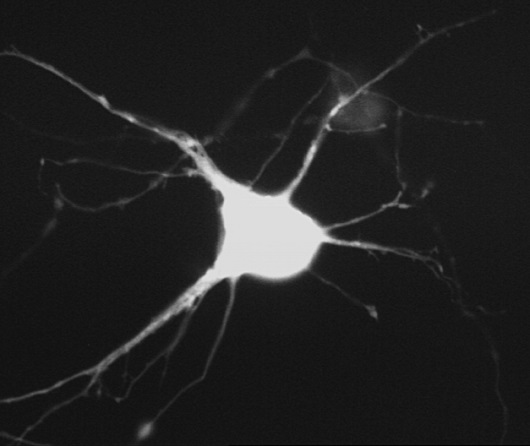New stem cell technology reveals fresh insights into Motor Neuron Disease

Scientists at the University of St Andrews have discovered new ways of studying what happens to motor neurons affected by Motor Neuron Disease (MND) by using stem cells derived from patient skin samples, according to research published in Nature Communications today.
MND is a progressive neurodegenerative condition that attacks motor neurons, specialised nerve cells in the brain and spinal cord, causing the loss of signals from the brain to muscles and eventually leading to paralysis.
Approximately 5000 people in the UK live with MND at any one time, with approximately 5 people dying of the disease every day. There is currently no cure for MND and treatment options are limited.
The joint research project led by scientists from the University of St Andrews and the University of Edinburgh has shown that even before they show any signs of damage, motor neurons affected by MND lose the ability to generate the electrical signals required to make muscles contract due to changes in specialised proteins called ion channels.
Dr Gareth Miles from the University of St Andrews and lead researcher on the project, said:
“Learning more about how and why motor neurons are lost in MND plays a crucial role in developing new treatments and ultimately finding a cure for this devastating disease. Using new developments in stem cell technology has enabled us to compare the function of motor neurons from healthy individuals with those from patients suffering from different forms of MND.”
Dr Miles was supported in his research by University of St Andrews’ PhD student Anna-Claire Devlin and Professor Siddharthan Chandran from the University of Edinburgh.
Dr Miles continued:
“Our findings suggest this may be an early step in understanding and ultimately treating the disease process of MND and highlights ion channels as potential targets for future therapies. Our work also demonstrates that studying the function of stem cell-derived motor neurons could be important for the development and testing of new drugs to treat and eventually cure the disease.”
Notes to news editors
Funding was provided by Motor Neurone Disease Association, the only charity in England, Wales and Northern Ireland focused on MND care, research and campaigning. To find out more go to: www.mndassociation.org
About motor neurone disease (MND):
- MND is a fatal, rapidly progressive disease that affects the brain and spinal cord.
- It attacks the nerves that control movement; people can still think and feel, but their muscles refuse to work.
- It can leave people locked in a failing body, unable to move, talk, and eventually, breathe.
- It affects people from all communities.
- It kills five people every day in the UK – 30% within a year and more than 50% within 2 years of diagnosis
- It has no cure.
Researchers:
- Dr Gareth Miles (University of St Andrews) – Senior Lecturer, School of Psychology and Neuroscience; Co-director of Institute of Behavioural and Neural Science; Partner member of the Euan MacDonald Centre for Motor Neurone Disease Research. For interviews contact: Dr Miles on 07551062418.
- Anna-Claire Devlin (University of St Andrews) – PhD student, School of Psychology and Neuroscience.
- Prof Siddharthan Chandran (University of Edinburgh) – MacDonald Professor of Neurology; Director, Centre for Clinical Brain Sciences; Director, Euan MacDonald Centre for Motor Neurone Disease Research.
Publication:
Anna-Claire Devlin, Karen Burr, Shyamanga Borooah, Joshua D. Foster, Elaine M. Cleary, Imbisaat Geti, Ludovic Vallier, Christopher E. Shaw, Siddharthan Chandran and Gareth B. Miles. “Human iPSC-derived motoneurons harbouring TARDBP or C9ORF72 ALS mutations are dysfunctional despite maintaining viability.”
Category Research